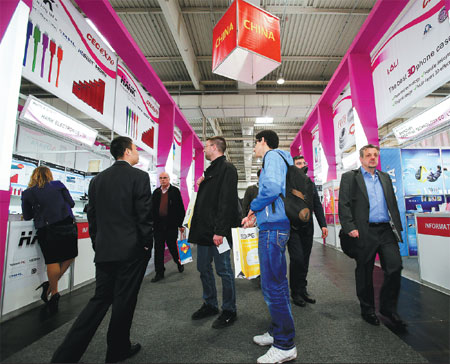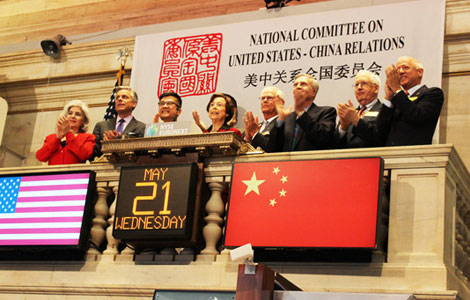Nation 'can lead' in FDI rules
Updated: 2014-05-27 07:12
By Li Jiabao (China Daily USA)
|
||||||||
China's foreign direct investment makes it major global player, UN official says
China will be at the center of the developing global framework of investment governance, with the world's second-largest economy set to become a net exporter of investment, an official of the United Nations Conference on Trade and Development told China Daily on Monday.
"From the turbulence of the past six years, it's evident that the globe needs a framework of investment governance. We have institutions for financial governance and economic governance, but there is no international infrastructure for investment governance.
"Working beyond bilateral and multilateral negotiations, we will have an acceptable framework to govern global investment activities," Mukhisa Kituyi, secretary-general of UNCTAD, said in an exclusive interview.
"We will not be too ambitious, but we'll have some procedures on governing investment, allowing for profitable moving of capital but reducing speculative and hedge fund behavior ... we will be helpful in creating a more predictable and stable global environment for investment," Kituyi added.
With China becoming a steady source of global foreign direct investment, analysts have forecast that in the next five years, China will become a net FDI exporter.
"That not only makes China a critical player in global investment, but it's also a major interested party in the evolving framework in which we govern globally the norms of investment movement," Kituyi said.
"If we are going to reach a discussion on the framework in which we define flows of investment, China is a primary party, more so than any other country. China's historic leadership role in global liberalization in the service of development places it squarely at the center of leadership on how we move on this."
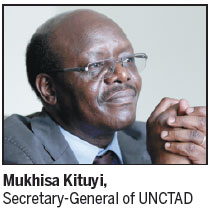
He added that there is "no clear time frame, no clear road map, but we have a review for the essential areas for global dialogue to focus on".
An ambitious goal of UNCTAD starting next year through 2030 is to unlock sovereign funds and pension funds as medium-and longer-term investment funds for FDI, rather than speculative funds looking for the maximum short-term returns, Kituyi said.
UNCTAD publishes the World Investment Report annually, with the 2014 issue due next month. This year, it's titled "Investing in Sustainable Development Goals".
"We noted very steady FDI outflows from China, which are projected to surpass inflows in a very short time," Kituyi said.
China was the second-largest FDI recipient in the world after the United States last year, and it was the third-largest outbound investor.
FDI inflows to China reached $117 billion last year, only $32 billion behind the US, while China's FDI outflows reached $90 billion, only $27 billion less than the inflows, according to UNCTAD.
In the 1990s, outflows only accounted for one-fifth of FDI inflows.
"From 2005 to 2011, FDI inflows into R& D activities in China increased from $40 million to nearly $5 billion, which is very significant and allows China to move up the value chain. One area worth our attention is the increasing sophistication and internationalization of Chinese companies, or Chinese transnational corporations linking the global value chains. They're significant in terms of Chinese FDI outflows," Kituyi said.
Ge Shunqi, deputy head of the Institute of International Economics at Nankai University in Tianjin, said that the establishment of the global framework of investment is "very urgent".
"Investment is the core of global economic activity, and the importance is increasing. But so far, the world has had no unified, coherent, transparent and stable framework for investment governance.
"The timing for establishing a framework is more mature than a decade ago, as developing economies account for more than half of the global FDI flow. The launch of the framework won't take long, since countries are advocating the initiative," Ge said.
He noted that China should play a "more active role in building up the framework" in view of its importance in the global economy and investment.
"China must take the leadership role, and a more active role in forging the framework. It should be the initiator and help define the topics and negotiation modalities of the framework, which will win it a louder voice in global rule setting and enhance its global competitiveness," Ge said.
"There is huge potential for China's FDI outflows, but China's overseas investment faces unfair and discriminatory treatment."
China is holding bilateral investment treaty negotiations with the US and the European Union, using the model of the "negative list", which specifies bans and restrictions on types of foreign investment.
"The 'negative list' approach is the ideal model for negotiating a global investment framework. China's domestic reforms and its BIT talks with the US and the EU are in line with the building of the global framework," Ge said.
lijiabao@chinadaily.com.cn
|
Foreign business representatives visit the stands of Chinese enterprises at an information technology exposition in Hanover, Germany. China is poised to become a net investment exporter in the coming five years, a United Nations official said. Zhang Fan / Xinhua |
(China Daily USA 05/27/2014 page13)

 'Face-Bikini' swimwear trend sweeps East China
'Face-Bikini' swimwear trend sweeps East China
 Iraqi pilgrims gather to honor Muslim saint
Iraqi pilgrims gather to honor Muslim saint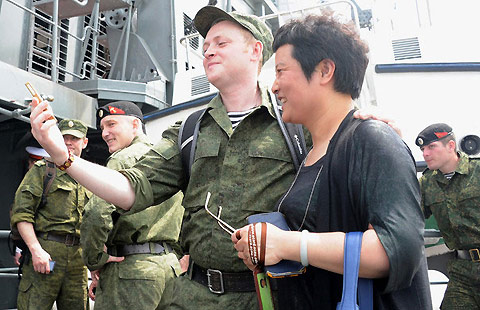
 Shanghai crowds flock to China, Russia battleships
Shanghai crowds flock to China, Russia battleships
 Documenting reaching fame the hard way
Documenting reaching fame the hard way
 US president pays surprise visit to Afghanistan
US president pays surprise visit to Afghanistan
 Forum discusses strategies to realize Africa's promise
Forum discusses strategies to realize Africa's promise
 South America is prime market for Chinese automakers
South America is prime market for Chinese automakers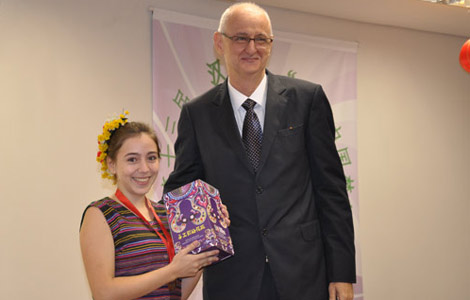
 Brazil names winners for 'Bridge' finals
Brazil names winners for 'Bridge' finals
Most Viewed
Editor's Picks
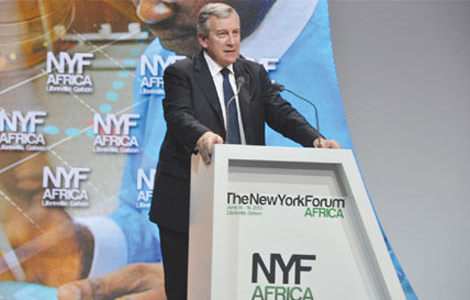
|

|

|

|

|

|
Today's Top News
US urged to explain cyberspace spying
Yao Ming mulls Clippers bid
Beijing subways to get 4G coverage
Xinjiang's stability a top priority
More efforts against arms smuggling
Anti-terror campaign launched
China lifts shellfish ban
Children from China enroll in US summer academic camps
US Weekly

|

|
